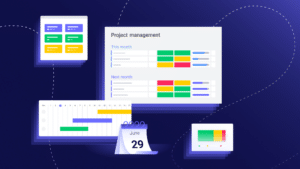As the world becomes more complex and dynamic, managing projects has become more challenging than ever before. One of the biggest challenges project managers face is keeping teams on track and ensuring that projects are completed on time and within budget. This is where business intelligence comes into play. In this article, we will explore the importance of business intelligence for project management and how it can help keep teams on track.

Introduction
Managing a project is not an easy task. It requires a lot of planning, coordination, and execution. There are many factors that can impact the success of a project, such as budget, timelines, team members, and resources. Project managers need to have a clear understanding of all these factors to ensure that the project is completed successfully. Business intelligence can help project managers make informed decisions by providing them with data-driven insights.
What is Business Intelligence?
Business intelligence refers to the process of collecting, analyzing, and reporting data to help organizations make better decisions. It involves using technology and tools to gather data from various sources, such as databases, spreadsheets, and applications, and transforming it into meaningful insights.
Why Business Intelligence is Important for Project Management?
Project managers need to have access to timely and accurate data to make informed decisions. Business intelligence can provide project managers with real-time data on project status, budget, timelines, and resources. This information can help project managers identify potential issues and make informed decisions to keep the project on track.
How Business Intelligence can Help Keep Teams on Track?
Business intelligence can help project managers keep teams on track in several ways:
1. Real-time Project Status Updates
Business intelligence tools can provide real-time updates on project status, including milestones achieved, tasks completed, and tasks pending. This information can help project managers identify potential roadblocks and take corrective action to keep the project on track.
2. Resource Management
Business intelligence can also help project managers manage resources more effectively. It can provide insights into the availability and utilization of resources, such as team members, equipment, and materials. This information can help project managers allocate resources more efficiently and ensure that they are being used effectively.
3. Budget Management
Business intelligence can help project managers manage project budgets more effectively. It can provide insights into project costs, such as labor, materials, and overhead. This information can help project managers identify cost overruns and take corrective action to stay within budget.
4. Risk Management
Business intelligence can also help project managers manage project risks. It can provide insights into potential risks, such as delays, cost overruns, or resource shortages. This information can help project managers identify potential issues early on and take preventive action to mitigate risks.
5. Performance Monitoring
Business intelligence can provide project managers with insights into project performance. It can provide data on project milestones, deliverables, and overall progress. This information can help project managers identify areas where performance can be improved and take corrective action to keep the project on track.
Implementing Business Intelligence for Project Management
Implementing business intelligence for project management requires a strategic approach. Here are some steps that project managers can take to implement business intelligence for their projects:
1. Identify Key Performance Indicators
Project managers should identify the key performance indicators (KPIs) that are most important for their project. KPIs can include project budget, schedule, resource utilization, and quality.
2. Choose the Right Business Intelligence Tools
Project managers should choose the right business intelligence tools that are best suited for their project. There are many business intelligence tools available, such as dashboards, reports, and analytics tools.
3. Gather and Analyze Data
Project managers should gather and analyze data from various sources, such as project management software, spreadsheets, and databases. This data should be transformed into meaningful insights that can help project managers make informed decisions.
4. Communicate Insights to Stakeholders
Project managers should communicate the insights gained from business intelligence to all project stakeholders, including team members, sponsors, and clients. This communication should be done in a clear and concise manner, using visual aids, such as charts and graphs.
Conclusion
Business intelligence is an essential tool for project management. It provides project managers with data-driven insights that can help keep teams on track and ensure that projects are completed successfully. By implementing business intelligence for project management, project managers can make informed decisions, manage resources more effectively, and mitigate project risks.
FAQs
- What are some common business intelligence tools used for project management?
- Common business intelligence tools used for project management include dashboards, reports, and analytics tools.
- How can business intelligence help with budget management?
- Business intelligence can provide insights into project costs, such as labor, materials, and overhead, helping project managers identify cost overruns and take corrective action to stay within budget.
- What are some common KPIs used in project management?
- Common KPIs used in project management include project budget, schedule, resource utilization, and quality.
- How can business intelligence help with performance monitoring?
- Business intelligence can provide project managers with data on project milestones, deliverables, and overall progress, helping them identify areas where performance can be improved and take corrective action to keep the project on track.
- What are the benefits of implementing business intelligence for project management?
- The benefits of implementing business intelligence for project management include making informed decisions, managing resources more effectively, and mitigating project risks.